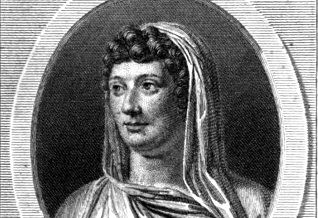Sophie Cottin's Claire D'Albe

Sophie Cottin: Counter-Revolutionary feminism and its impact on humanity
In the period 1816-20, Claire d’Albe was in fact the best selling novel in France, followed closely by Cottin's Élisabeth ou les Exilés de Sibérie (1806). Despite her being amongst the most popular authors of the early nineteenth century, Sophie Cottin is now largely forgotten. Yet, does an author have to be canonical to have changed humanity?
Cottin’s first novel quickly gained her a reputation, engendering fascination and raising eyebrows. During the Revolutionary decade and afterwards, when it was dangerous to speak out and when women were expected to be confined to the domestic sphere, Cottin exhibits a specific brand of counter-revolutionary feminism and a feminine mal du siècle which made her a great influence on later writers, and a valuable source of information on a turbulent period of history.
Christie Margrave is a Lecturer in French Studies in the College Arts & Social Sciences at the Australian National University. Her area of research expertise is 18th- and 19th-century French literature, and she has published on women's writing, ecocritical literature, and literature from the French colonies. She obtained her PhD from the University of St Andrews in 2015, during which she spent two years in Paris, working as a lectrice at the Université de Paris IV - La Sorbonne. Her first book Writing the Landscape: Exposing Nature in French Women’s Fiction, 1789-1815, appeared with Legenda in 2019.
This event is part of the Books that Changed Humanity series by the ANU Humanities Research Centre






